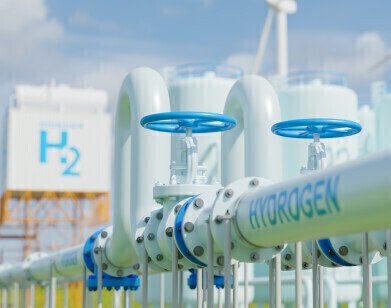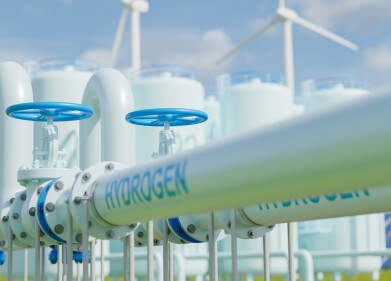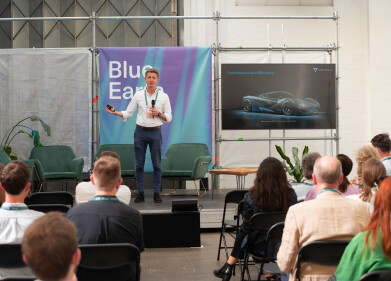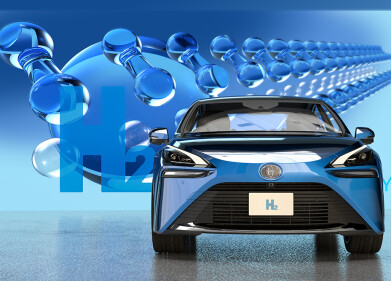Hydrogen fuel
Can hydrogen fuel turn construction green?
Jul 11 2023
As we tread into the epoch of cleaner energy alternatives, the road ahead for vehicles seems to be undoubtedly electric. Government directives and social pressures are propelling the automotive industry towards this shift, where soon motorists will be choosing battery-powered cars as the mainstay.
However, hybrid vehicles, a transitional choice, are already in the market. Yet, their sale will be outlawed from 2035, leaving electric cars as the sole alternative to traditional fuel-run vehicles.
It brings up an interesting question - could we have explored a different route? JCB, a leading player in the off-highway machinery sector, seems to believe so. They have the opportunity to choose between battery-electric technology and hydrogen.
The popular discourse on green transportation solutions is almost monopolized by electric vehicles. It's easy to overlook hydrogen-powered vehicles despite their impressive environmental compatibility. The key hindrance is the scarcity of hydrogen refuelling stations, hindering their mainstream adoption.
Yet, JCB has taken significant strides in this domain, trailblazing hydrogen-powered machinery. It's true that JCB's product lineup does not include cars, but it comprises heavy-duty machines like excavators and loaders. Just as the automotive industry, they too are on a mission to achieve zero emissions.
JCB's determination to develop carbon-neutral solutions for the construction and agricultural sectors, without government funding, is commendable. It's true that the machines JCB crafts don't require the high speeds that cars do, but they need a tremendous surge of energy for their functions— breaking rocks in quarries or excavating earth at construction sites. Battery-electric technology fails to meet these high-energy requirements, and the charging logistics for a 20-tonne excavator stuck in a quarry are, at best, complex.
Economic considerations push these machines to operate round the clock, making lengthy charging times impractical. JCB has found a solution to this quandary in hydrogen combustion engines. They've been manufacturing diesel engines since 2004, producing around 400 daily. A few years back, JCB broke new ground with a specially engineered prototype internal combustion engine running on hydrogen, a gas with zero carbon emissions.
This pioneering achievement was brought to life by brilliant British developers. The engine matches the power, torque, and performance of its diesel counterpart, sans the carbon. Refuelling JCB machines fitted with hydrogen engines takes mere minutes, a significant improvement compared to electric batteries.
Yet, when JCB announced this groundbreaking hydrogen-combustion engine technology, critics were quick to decry it, claiming hydrogen engines were inefficient. These critics, however, missed the mark. The hydrogen engines crafted in Derbyshire equal the efficiency of the diesel engines JCB has produced for nearly two decades.
Critics further argued that hydrogen-combustion engines could not be zero-emission due to the production of nitrogen oxides (NOx), a harmful air pollutant. JCB considers it a responsibility to ensure future hydrogen engines produce minimal NOx, contributing to a healthier environment.
JCB champions a future where technologies coexist — battery-electric, hydrogen, or a hybrid. With the goal to achieve net-zero emissions by 2050, it becomes essential to leverage all available technologies without delay.
Aiding the green revolution, JCB has already sold over 20,000 electric machines across 26 countries, mainly catering to smaller equipment needs. It's a testament to the fact that JCB isn't anti-electric. The question remains, however, if the automotive industry were free from regulatory constraints, could they have devised alternative solutions that don't burden customers with added complexity or cost? We may never know.
Currently, JCB's exploration into hydrogen combustion engines for construction machinery signifies a significant stride in greening the planet. Not just solar panels and electric cars, but even construction and agricultural machinery can contribute to carbon reduction.
JCB, a manufacturer of diesel engines for heavy machines, envisions a cleaner future with hydrogen-burning engines. These engines, still in the testing phase, are expected to begin pre-production by the end of 2023, serving the construction and agricultural vehicles sector. However, they must first overcome challenges such as the lack of a viable hydrogen distribution network and the efficient production of 'green hydrogen.'
Nevertheless, the future of green construction machinery seems promising, with JCB's dedicated efforts to pioneer hydrogen combustion engines. While more obstacles need to be overcome before we can deem the construction and agricultural machinery sectors truly green, it's apparent that the path forward will be a blend of technologies. As JCB steers its course towards greener solutions, the world waits for hydrogen supply to rise to the occasion, completing the sustainability puzzle.
Digital Edition
PIN 25.6 Buyers' Guide
January 2025
Buyers' Guide Directory - Product Listings by Category - Suppliers Listings (A-Z) Articles Analytical Instrumentation - ASTM D7042: The Quantum Leap in Viscosity Testing Technology -...
View all digital editions
Events
SPE Hydraulic Fracturing Technology Conference and Exhibition
Feb 04 2025 The Woodlands, TX, USA
Feb 05 2025 Guangzhou, China
Trinidad and Tobago Energy Conference 2025
Feb 10 2025 Point Lisas, Trinidad
Feb 11 2025 Lagos, Nigeria
Feb 13 2025 Manama, Bahrain



















